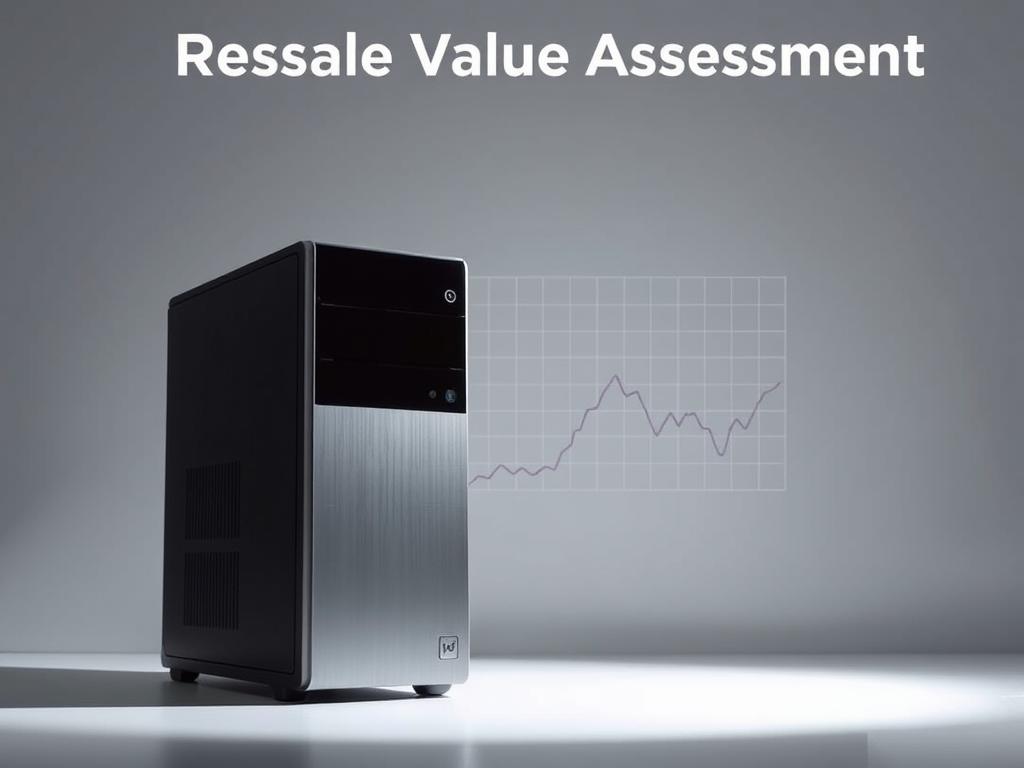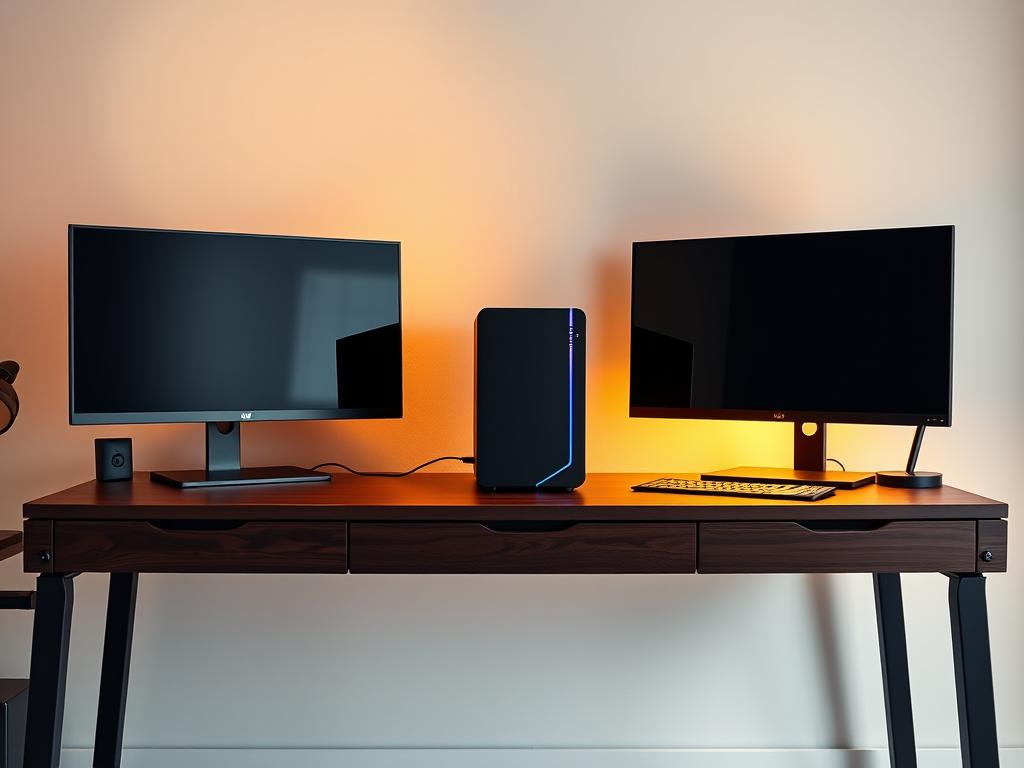Table of Contents
Selling a used PC can be tricky. You need to research and understand the market to know your computer’s worth. The value changes based on many factors, so be careful when setting a price.
Sellers must navigate complex pricing strategies for used PC parts. Accurate valuation requires market knowledge and awareness of tech depreciation trends.
The computer hardware resale market is always changing. Prices depend on component age, demand, and new tech developments. PCs often lose up to 50% of their value yearly.
To get the best price, sell your PC quickly. Learn about pricing methods to sell your computer confidently. Assess each part’s value and study current market trends.
With smart preparation, you can get a good price for your used PC.
Understanding PC Resale Market Dynamics
The PC resale market is a complex ecosystem. It’s driven by tech advances, brand reputation, and consumer preferences. To navigate this landscape, you need a strategic approach to maximise PC value retention.
A PC’s resale value depends on several key factors. These include component specs, age, physical condition, and brand reputation. Current tech standards also play a crucial role.
- Component specifications and age
- Overall physical condition
- Brand reputation
- Current technological standards
Factors Driving PC Value Retention
A used PC’s value hinges on various aspects. Modern buyers seek machines with robust performance. They also want compatibility with current software ecosystems.
Key value retention factors include:
- Processor generation and performance
- Graphics card capabilities
- Memory and storage configurations
- Upgrade potential
Market Trends and Brand Impact
Computer brands show different levels of value preservation. Premium makers like Apple often maintain higher resale values. Budget-oriented brands typically have lower resale values.
| Brand | Average Value Retention | Market Perception |
|---|---|---|
| Apple | 60-65% | High-end, premium |
| Dell | 40-50% | Business-oriented |
| HP | 35-45% | Consumer-friendly |
Current Market Conditions
The used PC market shifts with tech innovation and economic factors. PC value retention links closely to computing power and market demand.
Understanding market trends is crucial for maximising your PC’s resale potential.
Sellers can boost their strategy in several ways. Research current market conditions. Keep your device in good shape. Target the right buyer demographic.
How Much Can I Sell My PC For: Essential Value Factors

Setting the right price for your PC requires a strategic approach. Your computer’s specs and condition are key factors that buyers consider.
These factors affect your PC’s resale value:
- Age of the computer
- Current computer specifications
- Overall physical condition
- Performance capabilities
- Original purchase price
To determine your PC’s selling price, follow this strategy:
- Component Assessment: Check hardware specs like CPU, GPU, RAM, and storage
- Market Comparison: Look up prices for similar computer setups
- Condition Evaluation: Rate your PC’s physical and functional state fairly
As a starting point, consider pricing at 50% of the original cost. For example, a £870 computer might sell for £435-£525.
Focus on these specs when setting your price:
• CPU generation and performance
• GPU capabilities
• Total installed memory
• Storage type and capacity
• Overall system functionality
Keep in mind that electronics lose value quickly. Research thoroughly to set a fair and competitive price for your PC.
Popular Methods for PC Value Assessment
Assessing a used PC’s value requires strategic approaches. Computer equipment depreciates quickly, losing about 2% of its value weekly. Knowing effective assessment methods can help maximise your device’s resale potential.
Several reliable strategies can provide accurate pricing insights for PC value assessment. These methods help sellers understand current market trends and set fair prices.
Online PC Price Calculators
Price calculators offer a quick way to assess PC value. These tools analyse hardware specs, component age, system condition, and market demand.
It’s wise to use multiple calculators for accurate valuations. Cross-referencing platforms can provide a more comprehensive price estimate.
- Hardware specifications
- Age of components
- Overall system condition
- Current market demand
“Not all price calculators provide identical valuations, so cross-referencing multiple platforms is recommended.”
Community-Based Pricing Resources
Community pricing platforms use collective expertise for nuanced valuations. Sites like Reddit and tech forums allow users to share system specs.
Users can receive personalised pricing recommendations on these platforms. They also get insights from experienced tech enthusiasts.
- Share detailed system specifications
- Receive personalised pricing recommendations
- Get insights from experienced tech enthusiasts
Marketplace Price Analysis
A thorough marketplace price analysis involves researching actual selling prices. This includes platforms like eBay, Facebook Marketplace, and specialised tech resale websites.
This approach provides real-world market insights. It helps sellers understand current pricing trends for used computer equipment.
Combining these methods creates a robust PC value assessment strategy. This ensures sellers receive fair market value for their used computer equipment.
Brand Impact on Resale Value
Brand reputation greatly affects computer resale prices. Some brands consistently outperform others in the second-hand market. This creates significant differences in potential returns for sellers.
Apple devices maintain exceptional resale value compared to other manufacturers. Their strong brand reputation influences buyers’ willingness to purchase used equipment. Consistent quality and innovation contribute to Apple’s strong brand value.
- Consistent product quality
- Strong brand recognition
- Reliable performance history
- Perceived technological innovation
The link between PC brand value and resale prices is complex. High-end manufacturers like Dell, Apple, and Lenovo typically command higher prices in the second-hand market. This premium reflects consumer trust and expectations of durability.
Research shows that certain brands retain value more effectively. Here’s how some top performers stack up:
- Apple: Approximately 63.1% value retention
- IBM PCs: Around 63.4% value preservation
- Compaq: Impressive 69.3% resale value
Buyers favour brands with proven reliability and performance records. They also value excellent customer support. A strong brand reputation can boost a PC’s resale potential significantly.
Investing in reputable brands can be a wise long-term decision. It may lead to better returns when it’s time to sell your computer.
Component-Based Valuation Strategy
PC component value assessment requires a strategic approach. Understanding parts pricing is vital for evaluating resale potential. Each component depreciates differently, making detailed assessment crucial for accurate valuation.
- Component age and performance
- Original purchase price
- Current market demand
- Overall condition
CPU and GPU Value Assessment
CPUs and GPUs typically retain more value than other components. Professional hardware assessment suggests reducing their price by approximately 25-30% after two years of use. High-end models from Intel and NVIDIA tend to depreciate more slowly.
Storage and Memory Considerations
Storage drives and memory modules depreciate faster. SSDs and RAM modules usually lose value more quickly than CPUs and GPUs. Buyers often scrutinise these components during parts pricing evaluations.
Peripheral Components Evaluation
Motherboards, power supplies, and cases depreciate most rapidly. These might require a 40-50% price reduction based on age and condition. Highlight unique features or recent upgrades to potentially increase their perceived value.
Pro tip: Document all component specifications and maintenance history to justify your asking price.
Best Platforms for Selling Used PCs
Choosing the right platform to sell your used PC can greatly affect your experience and profit. Online marketplaces offer various options for tech enthusiasts looking to upgrade their systems. These platforms help sellers recoup some of their investment.
eBay is a top choice for selling used PCs globally. It provides robust seller protection. Facebook Marketplace offers local selling options with less shipping hassle.
Specialised tech platforms like Swappa focus on electronics. They offer streamlined processes for sellers targeting audiences interested in second-hand computer hardware.
Craigslist enables direct transactions without platform fees. However, it requires more personal management and safety considerations. Reddit’s hardware marketplace connects sellers with knowledgeable buyers.
Each platform has unique advantages for selling used PC equipment. Compare transaction fees, buyer demographics, and potential reach to find the best marketplace. Always provide clear listings, realistic pricing, and transparent communication to maximise your selling potential.
FAQ
How quickly do PCs lose their value?
PCs typically lose 30-50% of their value within two years. The steepest decline happens in the first year after purchase. Brand, specs, and market demand influence depreciation rates.
Are gaming PCs worth more when reselling?
High-end gaming PCs often retain better value than standard computers. Recent, powerful GPUs and processors boost resale prices. Specialised systems from brands like Alienware or custom builds can fetch higher prices.
Do Mac computers hold their value better than Windows PCs?
Apple computers generally retain value better than Windows-based systems. This is due to build quality, longer software support, and brand reputation. MacBooks and iMacs typically depreciate more slowly than equivalent Windows machines.
What components impact a PC’s resale value most?
The CPU, graphics card (GPU), and RAM are key value-determining components. Recent, high-performance processors from Intel or AMD boost resale value. Dedicated graphics cards from NVIDIA or AMD also increase worth.
Substantial RAM (16GB or more) will significantly raise a PC’s resale value.
How can I maximise my PC’s resale value?
Keep your PC in excellent condition and retain original packaging and accessories. Perform regular software updates and avoid extensive wear and tear. Sell before the system becomes outdated.
Document maintenance history and original purchase details to attract potential buyers.
Where are the best platforms to sell a used PC?
Top platforms include eBay, Facebook Marketplace, and Reddit’s hardware exchange communities. Craigslist and specialised tech resale websites like Swappa are also good options. Each platform offers unique advantages in reach, fees, and target audience.
How do I accurately price my used PC?
Compare similar models on marketplace platforms and use online price calculators. Consult tech forums and consider age, specs, condition, and current market trends. Research recent sale prices of comparable systems to set a competitive price.
Does a PC’s original warranty affect its resale value?
An unexpired manufacturer’s warranty can significantly boost a PC’s resale value. Transferable warranties from brands like Apple, Dell, or Lenovo provide buyers extra confidence. This can justify a higher selling price, making your system more attractive.









